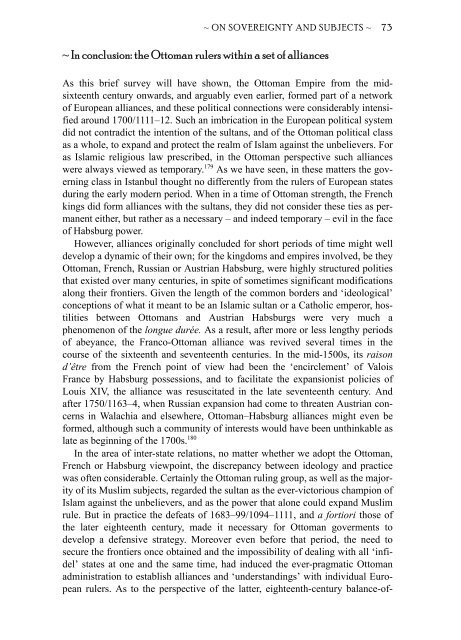The Ottoman Empire and the World Around It - Course Information
The Ottoman Empire and the World Around It - Course Information
The Ottoman Empire and the World Around It - Course Information
You also want an ePaper? Increase the reach of your titles
YUMPU automatically turns print PDFs into web optimized ePapers that Google loves.
~ ON SOVEREIGNTY AND SUBJECTS ~ 73<br />
~ In conclusion: <strong>the</strong> <strong>Ottoman</strong> rulers within a set of alliances<br />
As this brief survey will have shown, <strong>the</strong> <strong>Ottoman</strong> <strong>Empire</strong> from <strong>the</strong> midsixteenth<br />
century onwards, <strong>and</strong> arguably even earlier, formed part of a network<br />
of European alliances, <strong>and</strong> <strong>the</strong>se political connections were considerably intensified<br />
around 1700/1111–12. Such an imbrication in <strong>the</strong> European political system<br />
did not contradict <strong>the</strong> intention of <strong>the</strong> sultans, <strong>and</strong> of <strong>the</strong> <strong>Ottoman</strong> political class<br />
as a whole, to exp<strong>and</strong> <strong>and</strong> protect <strong>the</strong> realm of Islam against <strong>the</strong> unbelievers. For<br />
as Islamic religious law prescribed, in <strong>the</strong> <strong>Ottoman</strong> perspective such alliances<br />
were always viewed as temporary. 179 As we have seen, in <strong>the</strong>se matters <strong>the</strong> governing<br />
class in Istanbul thought no differently from <strong>the</strong> rulers of European states<br />
during <strong>the</strong> early modern period. When in a time of <strong>Ottoman</strong> strength, <strong>the</strong> French<br />
kings did form alliances with <strong>the</strong> sultans, <strong>the</strong>y did not consider <strong>the</strong>se ties as permanent<br />
ei<strong>the</strong>r, but ra<strong>the</strong>r as a necessary – <strong>and</strong> indeed temporary – evil in <strong>the</strong> face<br />
of Habsburg power.<br />
However, alliances originally concluded for short periods of time might well<br />
develop a dynamic of <strong>the</strong>ir own; for <strong>the</strong> kingdoms <strong>and</strong> empires involved, be <strong>the</strong>y<br />
<strong>Ottoman</strong>, French, Russian or Austrian Habsburg, were highly structured polities<br />
that existed over many centuries, in spite of sometimes significant modifications<br />
along <strong>the</strong>ir frontiers. Given <strong>the</strong> length of <strong>the</strong> common borders <strong>and</strong> ‘ideological’<br />
conceptions of what it meant to be an Islamic sultan or a Catholic emperor, hostilities<br />
between <strong>Ottoman</strong>s <strong>and</strong> Austrian Habsburgs were very much a<br />
phenomenon of <strong>the</strong> longue durée. As a result, after more or less lengthy periods<br />
of abeyance, <strong>the</strong> Franco-<strong>Ottoman</strong> alliance was revived several times in <strong>the</strong><br />
course of <strong>the</strong> sixteenth <strong>and</strong> seventeenth centuries. In <strong>the</strong> mid-1500s, its raison<br />
d’être from <strong>the</strong> French point of view had been <strong>the</strong> ‘encirclement’ of Valois<br />
France by Habsburg possessions, <strong>and</strong> to facilitate <strong>the</strong> expansionist policies of<br />
Louis XIV, <strong>the</strong> alliance was resuscitated in <strong>the</strong> late seventeenth century. And<br />
after 1750/1163–4, when Russian expansion had come to threaten Austrian concerns<br />
in Walachia <strong>and</strong> elsewhere, <strong>Ottoman</strong>–Habsburg alliances might even be<br />
formed, although such a community of interests would have been unthinkable as<br />
late as beginning of <strong>the</strong> 1700s. 180<br />
In <strong>the</strong> area of inter-state relations, no matter whe<strong>the</strong>r we adopt <strong>the</strong> <strong>Ottoman</strong>,<br />
French or Habsburg viewpoint, <strong>the</strong> discrepancy between ideology <strong>and</strong> practice<br />
was often considerable. Certainly <strong>the</strong> <strong>Ottoman</strong> ruling group, as well as <strong>the</strong> majority<br />
of its Muslim subjects, regarded <strong>the</strong> sultan as <strong>the</strong> ever-victorious champion of<br />
Islam against <strong>the</strong> unbelievers, <strong>and</strong> as <strong>the</strong> power that alone could exp<strong>and</strong> Muslim<br />
rule. But in practice <strong>the</strong> defeats of 1683–99/1094–1111, <strong>and</strong> a fortiori those of<br />
<strong>the</strong> later eighteenth century, made it necessary for <strong>Ottoman</strong> goverments to<br />
develop a defensive strategy. Moreover even before that period, <strong>the</strong> need to<br />
secure <strong>the</strong> frontiers once obtained <strong>and</strong> <strong>the</strong> impossibility of dealing with all ‘infidel’<br />
states at one <strong>and</strong> <strong>the</strong> same time, had induced <strong>the</strong> ever-pragmatic <strong>Ottoman</strong><br />
administration to establish alliances <strong>and</strong> ‘underst<strong>and</strong>ings’ with individual European<br />
rulers. As to <strong>the</strong> perspective of <strong>the</strong> latter, eighteenth-century balance-of-


